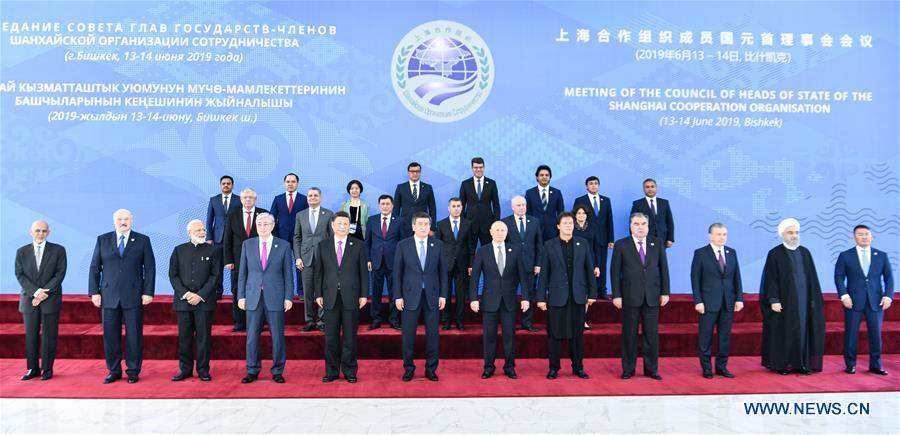SCO and China: A new Asian regional order
- By George N. Tzogopoulos
 0 Comment(s)
0 Comment(s) Print
Print E-mail China.org.cn, June 18, 2019
E-mail China.org.cn, June 18, 2019

Since 2001, the Shanghai Cooperation Organization (SCO) has served as an intergovernmental body aimed at contributing to stability in Asia. While the American presence in Asia was clearly significant already, the SCO gave some Asian countries the opportunity to start a new Eurasian security initiative themselves. Subsequently, China, Russia, Kazakhstan, Kyrgyzstan, Tajikistan and Uzbekistan decided to explore how closer collaboration among themselves could allow them to effectively address regional challenges.
In the years that followed, the initial, humble idea turned into a successful scheme with the potential to help shape a new Asian regional order without external patronage. India and Pakistan's decision to join the SCO in 2017 was perhaps the best proof. Two countries that routinely disagree on important security matters applied for membership, and were approved. They apparently thought dialogue and joint diplomacy within the SCO could better serve their interests than indifference or distant criticism.
A number of security goals are shared by the eight SCO member states, as well as observer states and dialogue partners. In 2017, Chinese President Xi Jinping spoke about the need to eradicate three evil forces: extremism, separatism and terrorism. The common fight against these necessarily became an immediate priority for the SCO, which expanded the role of the Regional Anti-Terrorist Structure (RATS) and made several measures to enhance cooperation on defense security, information sharing and law enforcement.
The recent Bishkek SCO meeting of the council of heads of state reaffirmed member-states' commitment to ensuring the enactment of a protocol on security guarantees to the Central Asian Nuclear-Weapons-Free Zone Treaty.
One year after his landmark speech in Qingdao, where he elaborated on how the "Shanghai Spirit" could be carried forward, Xi gave another critical speech in Bishkek. He focused on the importance of peace, multilateralism, win-win cooperation and long-term good neighborliness. Once again, the president has shared China's understanding of international relations, which replaces the logic of "hegemony" – often dominant in Western discourse – with that of a shared future built through combined and complementary efforts.
China is still keeping a low profile in world politics. But its continuous development, in parallel with the general trend towards multi-polarization, entails new responsibilities that it will not abandon. The 19th SCO meeting of the council of heads of state took place approximately three months after the second Belt and Road Forum for International Cooperation, so Xi called on participants to recognize agreements already reached.
Although the Belt and Road Initiative (BRI) is currently the most successful integration mechanism, its future success in Asia also depends on alignment with regional platforms. Its complementarity with the Eurasian Economic Union (EAEU) exists within a framework of mutual trust and inclusiveness. Whereas the BRI and the EAEU are regarded as contradictory projects in the West, China and Russia are demonstrating the opposite. In May 2018, China signed an agreement on trade and economic cooperation with the EAEU. Now, after Bishkek, more coordinated actions can be expected.
In another view, Bishkek discussions focused on Afghanistan, with Xi speaking about the need for the SCO to play a constructive role in promoting peace, reconciliation, stability and development there. China is exercising a careful and ambitious policy in accordance to UN resolutions, in order to contribute to the renewal of the peace process and the integration of Afghanistan into the tide of regional development, including SCO initiatives. China has also been active in providing humanitarian assistance by training Afghan officers and granting scholarships.
The more the SCO grows, the more its member states are able to take the fate of security in the region into their own hands – a region that, with India and Pakistan, covers over 60% of the Eurasian geographical area. Observer states and dialogue partners might share similar opportunities in the medium- and long-term.
Yet the SCO is not only about hard security. The Chinese view that security and prosperity should be interwoven is applicable here. The SCO promotes economic collaboration and globalization, as well as supports cultural exchanges and facilitates infrastructure works via its business council together with the interbank consortium. This holistic approach has laid the foundation for the present success of the SCO, and guarantees it will flourish in the future.
George N. Tzogopoulos is a columnist with China.org.cn. For more information please visit:
http://www.formacion-profesional-a-distancia.com/opinion/GeorgeNTzogopoulos.htm
Opinion articles reflect the views of their authors, not necessarily those of China.org.cn.
If you would like to contribute, please contact us at opinion@china.org.cn.





